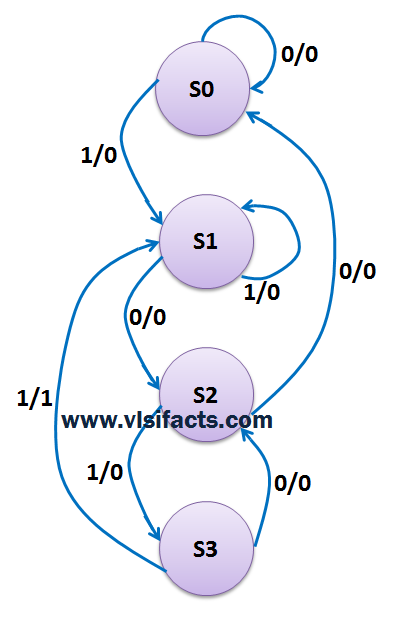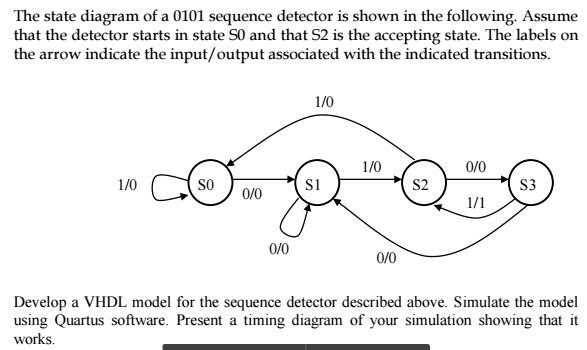Mealy overlapping
Table of Contents
Table of Contents
If you’re trying to design a sequence detector, one of the most important steps is drawing a state diagram. However, figuring out how to draw a state diagram for sequence detector can be a daunting task for even experienced designers. In this article, we’ll break down the process step-by-step to make it easier for you to create an accurate and efficient sequence detector for your needs.
Many designers struggle with drawing state diagrams because they can be complex and confusing, especially when dealing with long and complicated sequences. Additionally, some designers may not have a clear understanding of the different components and signals that need to be included in a state diagram. All of these factors can make creating a state diagram for a sequence detector a challenging task.
The first step in drawing a state diagram for a sequence detector is to determine the sequence you want to detect. Once you have identified the sequence, you need to determine the number of states required to detect that sequence. The next step is to map out the different states and the transitions between them. You also need to define the inputs and outputs used in the detector to create an accurate state diagram.
In summary, to draw a state diagram for a sequence detector, you need to determine the sequence you want to detect, map out the different states, define the inputs and outputs, and create transitions between the states.
How to Draw State Diagram for Sequence Detector: Step-By-Step Guide
When I was first learning how to draw state diagrams for sequence detectors, I struggled with figuring out the number of states required for a given sequence. However, once I was able to break down the process into smaller steps, it became much easier to create accurate and efficient state diagrams for any sequence detector.
Step 1: Determine the sequence to detect
The first step in drawing a state diagram for a sequence detector is to determine the sequence you want to detect. For example, let’s say you want to create a sequence detector for the sequence “1101.”
 Step 2: Determine the number of states required
Step 2: Determine the number of states required
Once you have identified the sequence to detect, you need to determine the number of states required to detect that sequence. For a given sequence, the minimum number of states required is equal to the length of the sequence. In our example, our sequence is “1101” so the minimum number of states required is 4.
Step 3: Map out the different states and transitions
After determining the number of states required, you need to map out the different states and transitions between them. Each state represents a different possible sequence that the detector may be in at any given time, and each transition represents a change in the input sequence which causes the detector to move from one state to the next.
Step 4: Define the inputs and outputs
Next, you need to define the inputs and outputs used in the detector. In general, a sequence detector takes a digital input signal and produces a digital output signal that indicates whether or not the desired sequence has been detected. In our example, we would define our inputs as “0” and “1” and our outputs as “0” (no match) or “1” (match).
Examples of Sequence Detector State Diagrams
Here are a few examples of state diagrams for different sequence detectors:
 In the above example, we have a state diagram for a 1010 sequence detector using the Mealy model.
In the above example, we have a state diagram for a 1010 sequence detector using the Mealy model.
 In the image above, we have a circuit diagram for a sequence detector that detects the sequence “1101.”
In the image above, we have a circuit diagram for a sequence detector that detects the sequence “1101.”
Tips for Creating Efficient State Diagrams
When creating state diagrams for sequence detectors, it’s important to keep a few tips in mind to ensure that your design is as efficient as possible. Here are a few tips to keep in mind:
- Try to use the minimum number of states required to detect the desired sequence, as this will help reduce the complexity of the circuit and simplify testing.
- Ensure that you have defined all input and output signals clearly to avoid any confusion or errors during the design process.
- Label your states and transitions clearly to ensure that you can understand your diagram easily.
Question and Answer
1. Why is drawing a state diagram important in sequence detector designing?
Ans: A state diagram is important in sequence detector designing because it helps to identify the different states required to detect a specific sequence and the transitions between them.
2. In what format should I create my state diagram?
Ans: You can create your state diagram in any format that is most comfortable for you, including pencil and paper or using software such as Microsoft Visio or Lucidchart.
3. How many states are required to detect a specified sequence?
Ans: The minimum number of states required to detect a specified sequence is equal to the length of the sequence.
4. How can I ensure that my state diagram is efficient?
Ans: To ensure that your state diagram is efficient, you should use the minimum number of states required to detect the given sequence, define your inputs and outputs clearly, and label your states and transitions clearly.
Conclusion of how to draw state diagram for sequence detector
Drawing a state diagram for a sequence detector can be a challenging task, especially if you’re new to the design process. However, by following the steps outlined in this article and keeping a few tips in mind, you can create accurate and efficient state diagrams for any sequence detector you need. Remember to always keep your design goals in mind, and don’t be afraid to experiment with different diagrams until you find the one that works best for you.
Gallery
State Diagram And State Table For Sequence Detector Using Mealy Model

Photo Credit by: bing.com / mealy overlapping
Circuit Design Of A Sequence Detector - VLSIFacts

Photo Credit by: bing.com / detector mealy 1101 circuit
Digital Logic | Design 101 Sequence Detector (Mealy Machine

Photo Credit by: bing.com / detector sequence mealy 101 machine logic digital geeksforgeeks
Solved: The State Diagram Of A 0101 Sequence Detector Is S… | Chegg.com

Photo Credit by: bing.com / sequence detector state diagram 0101 assume shown following vhdl solved input answer questions transcribed text show model
1010 Sequence Detector Mealy State Diagram - In The Mealy Model, The

Photo Credit by: bing.com / sequence detector mealy recognizer





